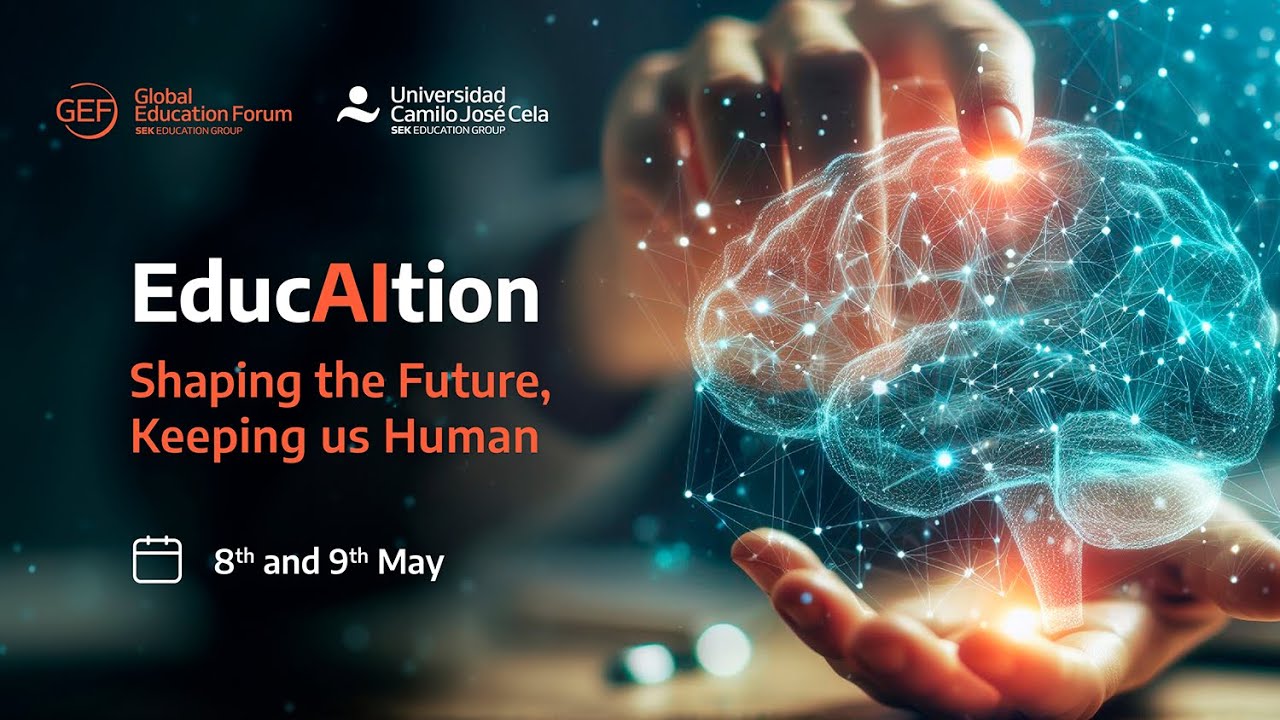Your view on AI and creativity will never be the same
Summary
TLDRIn a thought-provoking discussion, experts explore the intersection of AI, creativity, and education, highlighting AI's potential to enhance human creativity rather than diminish it. They argue that artists and educators must adapt by embracing AI as a tool for innovation, just as previous generations embraced new technologies. The conversation emphasizes that AI allows humans to focus on higher-order tasks like contemplation and creativity, freeing them from mundane chores. The future of art and education lies in the ability to think critically and communicate visions effectively with AI, preparing humanity for a world where technology amplifies rather than replaces human potential.
Takeaways
- 😀 AI can be a tool for artists to enhance creativity, not a threat to their livelihood.
- 😀 Technology, including AI, is an extension of human will and can help humans evolve by removing mundane tasks.
- 😀 Contemplation, not just thinking, is what makes humans unique, and AI frees up time for it.
- 😀 AI could help artists like Michelangelo excel even further by providing new creative tools and mediums.
- 😀 Creativity may no longer be seen as uniquely human, as AI can now synthesize creative outputs.
- 😀 Education needs to focus on teaching critical thinking, problem-solving, and creativity rather than outdated subjects and rote memorization.
- 😀 The skill set for artists in the AI era will focus more on how they communicate with AI and guide its output.
- 😀 AI will likely change how people engage with creativity—it's not about losing the essence of human artistry but transforming the process.
- 😀 The true value of AI in creativity depends on the input from the user; AI outputs are only as good as the questions or prompts given to it.
- 😀 In the future, AI could enable a direct thought-to-image or thought-to-video process, radically altering the creative landscape.
Q & A
What is the primary concern of artists regarding AI in creative fields?
-Artists are concerned that AI may threaten their livelihoods by automating creative tasks and reducing the value of human creativity. They worry about being replaced by machines in areas like painting, writing, and music production.
How do the speakers address the concern that AI might threaten human creativity?
-The speakers suggest that AI is not a threat but a tool that enhances human creativity, much like any other technology. They argue that tools like AI can be used to improve the creative process, offering artists new ways to express themselves, rather than replacing them.
What analogy is used to explain how AI can be seen as a helpful tool rather than a threat?
-The speakers compare AI to a knife for a chef. Just as a knife isn't a threat to a chef but a tool that makes their job easier, AI can be a tool for artists and creatives to enhance their work, rather than a threat to their livelihoods.
How does the conversation define 'humanity' in the context of AI?
-Humanity is described not as a static set of skills or tasks but as the ability to engage in higher-order activities, such as contemplation and creativity. AI is seen as a way to remove mundane tasks, thus giving humans more time for these uniquely human activities.
What does the speaker mean by 'AI is an extension of our will'?
-The speaker suggests that AI is an extension of human intent. Humans create technology with the purpose of using it to achieve specific goals, and AI, like other technologies, is a tool that reflects human creativity and decision-making.
What role does AI play in the evolution of art and design, according to the speakers?
-AI plays a transformative role by offering artists and designers new tools and possibilities for creation. The speakers suggest that figures like Picasso, who embraced new technologies in their time, would have eagerly adopted AI tools to create innovative works.
How do the speakers view AI's impact on the educational system?
-The speakers believe the educational system needs to evolve to better prepare students for a future with AI. This includes teaching critical thinking and how to adapt to technological changes, rather than focusing on outdated skills that are no longer relevant in an AI-driven world.
What is the future skill set required for an artist in the age of AI?
-The skill set required for artists in the AI era involves critical thinking, creativity, and the ability to communicate their ideas effectively to AI systems. Artists will need to embrace AI as a tool to enhance their work, focusing on vision and artistic intent rather than manual skills.
How might AI change the nature of creativity in the next five years?
-AI will likely continue to evolve, allowing for more advanced forms of creativity, such as thought-to-image or thought-to-video systems. The integration of AI into creative processes will blur the lines between human and machine-generated content, offering artists new ways to express their ideas.
What is the ultimate vision for AI in creativity as described in the conversation?
-The ultimate vision is a seamless integration of human thought with AI, where creativity can be expressed directly through the mind without the need for physical tools. This could lead to entirely new forms of art and design that are currently hard to fathom.
Outlines

このセクションは有料ユーザー限定です。 アクセスするには、アップグレードをお願いします。
今すぐアップグレードMindmap

このセクションは有料ユーザー限定です。 アクセスするには、アップグレードをお願いします。
今すぐアップグレードKeywords

このセクションは有料ユーザー限定です。 アクセスするには、アップグレードをお願いします。
今すぐアップグレードHighlights

このセクションは有料ユーザー限定です。 アクセスするには、アップグレードをお願いします。
今すぐアップグレードTranscripts

このセクションは有料ユーザー限定です。 アクセスするには、アップグレードをお願いします。
今すぐアップグレード関連動画をさらに表示

Georgia L. Anderson, Rory Sutherland, Stephan Pretorius and Antonis Kocheilas – AI | Nudgestock 2024

GEF Madrid 2024: Globalising Education with AI

AI will take our jobs and end the world. But that is a good thing! | Ged Byrne | TEDxSt Albans

AI and Creativity - a British Council English Podcast

ROBOT KERJA, KITA NGANGGUR | TIBA TIBA PODCAST

Human Brain vs. Artificial Intelligence: Reality and Prospects
5.0 / 5 (0 votes)
